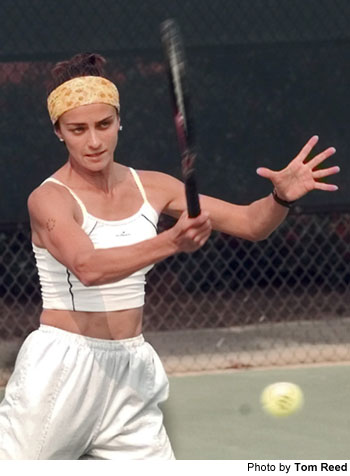
October 31, 2000 — I’m not sure Antonina Grib understood just how bad a tennis player I actually am. Such ineptitude is hard to describe over the phone.
But in person, out there on the court, I’m pretty good at getting the point across. And I believe I saw Grib — the reigning NAIA national champion — fight back a smile after we had exchanged just a few practice volleys last week at Brenau University.
“Coach says you’d like to start up 5-0, no?” the 22-year-old sophomore said, trying to be kind.
“Um, yeah,” I replied sheepishly. “Is that OK?”
“Yes,” she said with a snicker. “That should be no problem.”
I had shown her, obviously, all she needed to see. So she gave me that 5-0 lead, gladly — then pummeled me 7-5, promptly.
I believe I won — no, failed to lose — a total of five points. Six, perhaps. It all went by so fast.
Grib is growing accustomed to such short work. At the Rolex National Small College Championships Oct. 19-22 in Memphis, Tenn., the native of Belarus lost just 13 games in 10 sets in five matches, all wins.
She defeated the No. 1 seed 6-1, 6-0 for the NAIA title and then breezed through the field in the “Super Bowl” of Small College Tennis, which featured champions from the NCAA Divisions II and III, NAIA and junior college tournaments.
6-2. 6-1. That’s how easily Grib defeated Emory’s Mary Ellen Gordon for the championship.
“No, I didn’t expect to win,” Grib said — referring to the “Super Bowl,” not her match with me, I suppose. “But I felt pretty good.”
The win made Grib the second Brenau player to win the “Super Bowl” since 1995. Golden Tiger Laurence Neuville won back-to-back titles in ’95 and ’96. The win also earned Grib a berth in the 2001 Rolex National Intercollegiate Indoor Championships Feb. 1-4 in Dallas, heralded as the toughest amateur tennis tournament in the world.
Just another stop along the peculiar path that led Grib out of the former Soviet Union and into the Bible Belt of Northeast Georgia less than one year ago.
Times are tough still in Belarus, Grib said, nine years after communism’s collapse. The small country of 10 million inhabitants is almost completely dependent on Russia — which purchases 70 percent of its exports — and the Russian financial crisis, which began in the fall of 1998, severely affected the Belarussian economy.
Things like tennis, understandably, took on less importance. And athletes, like Grib, who grew up accustomed to government funding of their sport, were left to fend for themselves.
“I had a hard time getting to the tournaments, having the opportunity to practice, to have new shoes, new rackets, new balls,” Grib said. “I didn’t have these things for a long time.”
Many athletes now look outside Belarus to continue their careers. Grib was originally set to play for the Clemson Tigers, but an eligibility snafu forced her to enroll elsewhere.
Brenau head coach Bill Rogers, coming off his team’s 1999 national championship, was more than happy to welcome Grib into his program — especially after he saw her play for the first time — and the school gave her a full athletic scholarship.
“She probably has the best racket head speed of any player I’ve ever coached, maybe any college player I’ve ever seen,” said Rogers, whose teams have posted a 208-31 record since 1990. “Her racket head speed is that good.”
Grib, a fashion design major, is the latest to ride the international pipeline into Brenau. Rogers’ current roster includes a Colombian, an Egyptian, a Malaysian and two Brits.
The Brenau name is out there. The team’s growing reputation — and the Internet — help see to that.
Grib, for one, likes Gainesville.
“The air, it’s so fresh,” she said. “I was born in downtown Minsk, which was smoke, cars, noise. We didn’t have a lot of trees.”
Grib’s parents still live in Belarus. Her father, a former taxi driver, is now a tennis coach. Her mother is an engineer at a refrigerator factory. When Grib visited last, she showed her father all of her accomplishments, lined up all of her awards on the kitchen table.
Her father didn’t say a word. He just cried.
He cried because his daughter, as a freshman, was the No. 1 player on the No. 2 tennis team in the country. She was an All-American twice — singles and doubles — an Academic All-American, Georgia-Alabama-Carolina Conference Player of the Year, Southern Regional Player of the Year, and the NAIA Player to Watch.
Grib’s father cried — and he didn’t even have to play her.
I did.
“So, you realize now I wasn’t lying when I said I wasn’t any good,” I said afterward, as I gathered my belongings and my ego.
She paused for a moment, still trying to be kind, and laughed: “Yeah. You were right.”
Then she picked up her racket and headed back out to the court. Her real workout was about to begin.
